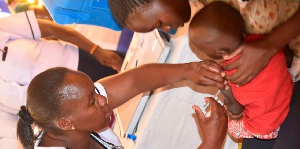A recent report based on the Ghana Demographic and Health Survey (GDHS) data has revealed a concerning trend in childhood vaccination rates, with a notable increase in the percentage of children aged 24 to 35 months who were not fully vaccinated according to the national schedule between 2014 and 2022.
According to the data, the percentage of children in this age range who were not fully vaccinated increased by 15.1 percentage points over eight years.
In 2022, almost 3 in every 5 children (57.6%) had not received the full complement of vaccines recommended by the national schedule, compared to about 2 in every 5 (42.5%) in 2014.
Dr. Kwame Asante, a public health expert, expressed concern over the findings.
"This increase in unvaccinated children is alarming and poses significant public health risks. Vaccines are crucial for protecting children from preventable diseases, and any decline in vaccination rates is cause for concern," he said.
The report also highlighted regional disparities in vaccination coverage, with more than half of children aged 24 to 35 months not fully vaccinated according to the national schedule in ten out of the 16 regions.
The Northern Region recorded the highest percentage, with four in every five children (81.5%) unvaccinated, followed by the Western Region (68.5%) and Savannah Region (66.9%).
However, there were notable exceptions, with the Volta Region reporting the lowest percentage of unvaccinated children (26.7%), followed by Greater Accra (40.4%).
As World Immunization Week approaches, commemorated annually in the last week of April, health authorities are emphasizing the importance of vaccination to save lives.
This year's celebration, which begins from Wednesday, April 24, to Tuesday, April 30, holds particular significance as it marks the 50th anniversary of the Expanded Programme on Immunization (EPI).
Dr. Asante emphasised the critical role of immunisation in safeguarding public health, indicating: "World Immunization Week serves as a reminder of the lifesaving benefits of vaccines. We must redouble our efforts to ensure that all children have access to the vaccines they need to stay healthy and protected."
Efforts to address the decline in vaccination rates include targeted interventions to improve vaccine accessibility and awareness campaigns to educate parents and caregivers about the importance of childhood immunisation.
Health News of Wednesday, 24 April 2024
Source: classfmonline.com
World Immunisation Week: Increase in unvaccinated children in Ghana raises concerns
Business
















